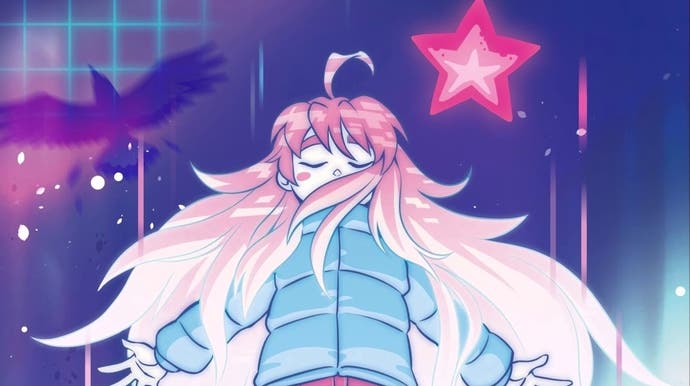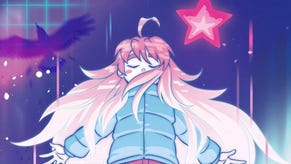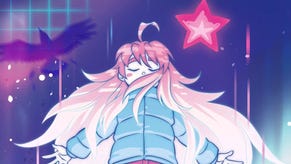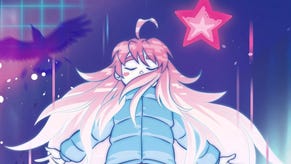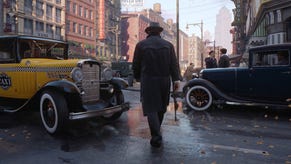Playing Celeste's Farewell DLC is a masterpiece of High Resolution Play
Game-Feel and Game Feels.
Happy Second Birthday Celeste! I'm late again, I know. But thanks to the Farewell update released last September, Celeste is imprinted on my 2019 as much as it was the year before. Because Farewell is brilliant.
Now, this is a small spoiler, but you have to hold down as Madeline falls, to speed her descent enough to just (just!) catch the falling spring block as it plummets away from you.
Holding down stretches Madeline, squashing and squeezing her as she accelerates - way too quick for comfort - towards a tiny, moving chunk of moon rock. This is right at the beginning of Farewell, Celeste's DLC finale. And it's precise: Panicky and stylish and more genuinely thrilling through the fingers than some whole games manage with their-canned, smoke-and-mirror bluster.
And even though I reckon I'm pretty fluent in Celeste - which I not only beat, but beat-beat-beat (those C-Sides!) - it took me ages to work out. Ages! Ages to consider pimping-up the dropping-down, that core part of a platformer's rise and fall; its inhale-exhale. And this was before the really new stuff: The jellyfish parachutes and the blowfish and That Bird. Here was a problem of springs and spikes, Celeste's bread-and-butter, and a long chasm I couldn't seem to make it across, teasing out a new trick from a palette of movement I thought I already knew.
But Farewell is just getting started.
What unfolds thereafter is a mini-epic, practically a game unto itself that just keeps on extending, surprising, delighting, exhausting. Madeline is trying to find a friend, and this takes place on the Moon. As with Celeste Mountain, it's a journey inwards as well as onwards. But this is more of a Majora's moon, with its own hazy strangeness. With pinks and cyan, and distant star fields of starfish. With hi-hats and synth, then cello and violin. With platforms that bob like buoys and tight coral mazes that shine iridescent, like a sea shell's inside. And, later on, a glitch.
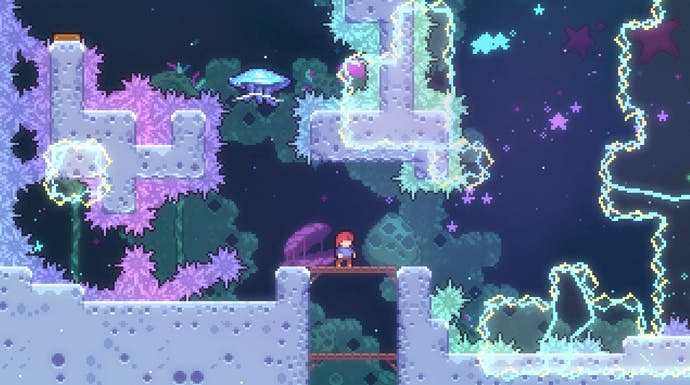
A little way in there's a drop - literal, musical, environmental - that I wish everyone could experience, an uprush ascent from darkness and synth into gleaming, blue-bloom luminescence. With tiny, glowing amoeba-creatures swimming through the air. Then, this chorus of strings like morning has broken.
Man, I love a good platformer! The feel of them. All that after-touch. A little more press on the jump button, before a quick release. A little more holding right, then a little less. All that in-air inertia management that makes the whole jumping arc feel analogue and alive, with the real, sticky physicality you get from holding down the run (or gun, or whatever) button throughout. All the kneading of the pad needed to leap.
And Celeste's game-feel is one of my favourites, where each jump is a pitcher's wind-up, a curving feint before a blink-fast dash elsewhere - any direction, whatever your momentum, no questions asked. And where walls are grabbed and clung to with the R-Trigger, and the Ueda-ish sense of tactile connection this builds. Where every animation has bounce. And, I've realised, where the movement feels so supple, granular; with so much bend and flex and nuance.
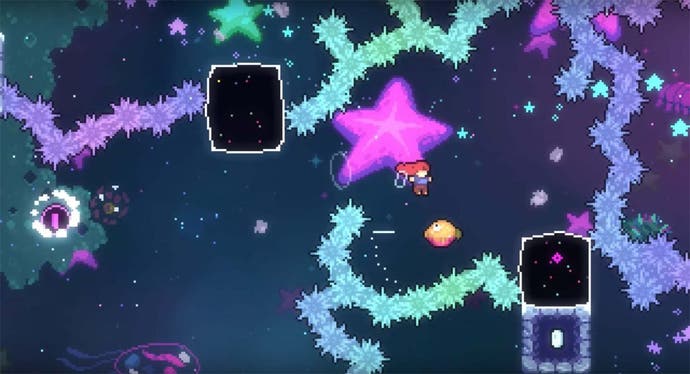
Because Farewell is calibrated from the off in the mode of Celeste's hardest challenges (the beat-beat, and the beat-beat-beat), each screen feels like a level in itself: Advanced Classes in Celeste's instrument of movement, demanding a new mastery, a subtlety of understanding of something you thought you already had down. It requires an attention to the particular, to increasingly small slivers of space-time, screen-inches compressed with micro-dramas that you half work out, half feel out. A little extra lean into a wall-side escalator, perhaps. A pocket of slack if I let go slightly later.
I'm not sure I've played another game in such high fidelity. With such high-resolution control. With enough depth that it can reveal a crouching dash jump - that was there all along - in the Core C-Side, the second bonus version of an already bonus level. And then in a post-game DLC like Farewell it can - impossibly, astoundingly - reveal another move midway (and it's a doozy). It's one of gaming's all-time greatest, most robust and rewarding game-feels, I think. And Farewell feels like not just an expansion but an encore, an Out-With-A-Bang finale that manages to fold the old into the new.
So, all your favourite toys return, like the Celestial Jelly and the Hairy Brambles (not their official names) as old friends slightly changed (and sometimes coupled up). And the new additions feel indispensable on arrival, lending new rhythms and weights. The jellyfish gliders in particular, have this gratifying, dash-extending fwip and then a parachute whumph and then a languid, tugging glide that makes the air feel viscous and thick; with a soft hum of connection through the pad throughout. I suppose they make a thematic sort of half-sense too: adding some subaquatic float and suspension to what were already the flingiest, soaringest lines in gaming.
But all your favourite flavours of Celeste-ing return as well. One act is a key-hunt branching out from a central hub, like in Mirror Temple. Another hangs like a huge, suspended engine of movement for Madeline to arc in and around and over and under in one uninterrupted sequence; a C-Side unto itself. Sometimes, a room might be a breathless run of light-touch platforming that you skim over, like a stone on water. At others, an act will take the edges of an old mechanic - like the on-off acapella beat-blocks, and the gameplay kink that means they stay in when Madeline is in front of them - and embrace and extend it into a whole section of syncopated play, where you play in off-beats and in-betweens.
Special mention to the entire room given to a tiny aside to do with the bounce of a cloud, that plays like a joke told in jump.
And the things you do with springs.
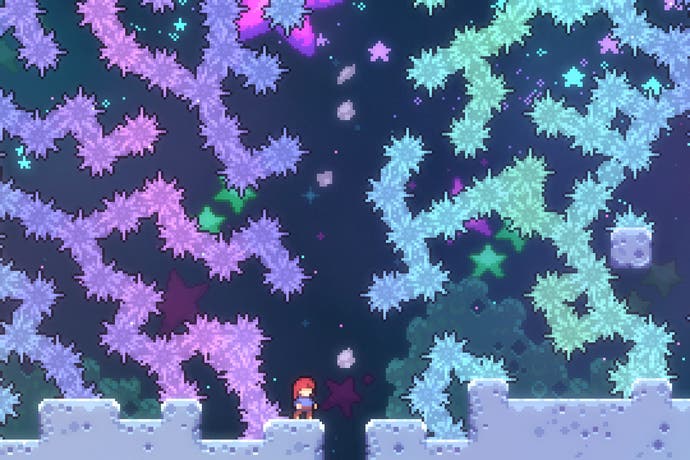
Sometimes I'll watch back my Switch recordings agape, dumbly repeating 'No Way' (and worse), slightly incredulous at the routines I somehow managed, too absorbed and in a state of tired automaticity to fully appreciate as I did them. Because the things you're asked to do are amazing, absurd. Often, levels feel less like obstacle courses to overcome, than contraptions designed to require platforming badassery. Jumping beauty. Motion joy. As if screens were an inverse-engineered machinery of moments, a celebration of the wordless, ineffable pleasures of momentum, purified and accentuated in two dimensions (without the dilution and disruption of a z-axis and a camera). Like outrageous solos of space and timing - with elasticity and swing, with Matrix, anime style and flourish - but bottled and fixed by these challenges that necessitate them. Madeline and her trailing hair giving weight and shape to brilliant patterns of movement, like leaves giving shape to the wind.
(I am writing this in Autumn).
But, the other thing I like about platformers, about Celeste, about games, is that unique, thickened space they take place in. Where light and sound and feel are wound together, like threads of a rope, that tactile uber-texture when everything coheres into a compound, playable thing. Not as direct as synaesthesia, I don't think, where one sense is felt in another; nor as literal as rhythm-action. But another thing that happens, triangulated from all these elements, forming somewhere between you and the screen. I'm sure there is a word for this - probably hyper-specific, probably German, probably GameFeelengeist or something - but I don't know it. But I know that I've loaded up Celeste to dash around Reflection's spacey caverns, playing life into its palette of emerald greens and crystalline blues.
And I know that in Farewell, the challenge is so high I just submit to the endeavour, the inevitability of death; engaging the determined, meditative half-focus required for these groundhog-loops of gameplay to slowly, surely improve. Entering that enclave of ever-time, that absorption primed with the potential of progress. Precise coils of gameplay being wound tight into fingers and thumbs. Stirring myself into the scene by repetition, accumulation, the whole thing gaining mass. So that talking about the music, or the graphics, or the game-feel in isolation doesn't quite work.
Instead, there's purple star fields. A pulse in the pad in time with a beat. A bird that swings like a lasso. Fluorescent shower-fall on a jelly umbrella. Bright arpeggios that rise and fall like waves alongside rhythms and patterns of time and space. But most of all, a thickening in the middle.
Do you remember in school, where one kid would hold their hands out, palms inwards, at about shoulder width apart?
Another kid - the accomplice - would stand opposite and hold their hands outside the first person's, like brackets. Then the first kid, their hands on the inside, would try to squeeze out as hard as they could, to bring their arms apart. The second guy would be pushing their hands inwards to resist this. And now both are locked in an intense, straining stillness like in those movie scenes where someone is desperately pushing a knife to another person desperately resisting. Here though, it's basically just foiling a clap.
And then, after a while, they release! And from this: magic. The first child's arms are drifting automatically apart - now free and loose and unimpeded. But when he tries to bring them together again, there's a stubbornness. Felt as a swell, a sphere, a something within his palms. A ball of force that plumps the air, like a Hadoken before it turns to flame.
And it reminds me of games, the way they happen; in your muscles as well as through your senses.
In Celeste, there's also kindness. A reassuring postcard and a You Can Do It, a Campfire Conversation and now, in Farewell, a 'Hello Strawberry'. There's that bobble of the menus, and those marker-pen borders, and a new Assist Mode spiel, now re-written to be more inclusive. So many instances of care in this thing you push and press your way through, inflecting the whole experience, the tone of this world that you open up from a home screen.
So that what emerges - between the hands, after hours, in aggregate - is something else: a knot of associations that also feels like encouragement, a comfort, a strength. Like something good, an affirmation sounded-out in play and firmed up by effort. With a relatability and warmth not just spoken or stated, but solid and tactile, full-bodied, made of movement and input and response: What Celeste feels like whole.
I could have missed out! When I first played Celeste I nearly settled for all the strawberries, and maybe a few B-sides. Cashing out at the usual game-replete of A Pretty Solid Effort. If I'm honest, maybe my usual replete in general. But my cousin takes things lighter than me (example: he's one of those guys who can go onto Netflix and just start watching things randomly) and his continued interest tipped me over into trying, and then succeeding, at something that at first seemed too hard; a challenge too far.
But I have an actual Celeste scarf that says You Can Do It. Because I did!
And now I've done Farewell, too. A generous gift of an experience, with new sounds and sights, and new ways to play. But it's also a celebration, and a consolidation, of something brilliant: A game you hold between your hands, that feels like comfort, kindness, strength. First with the pad, and then just the feeling.
